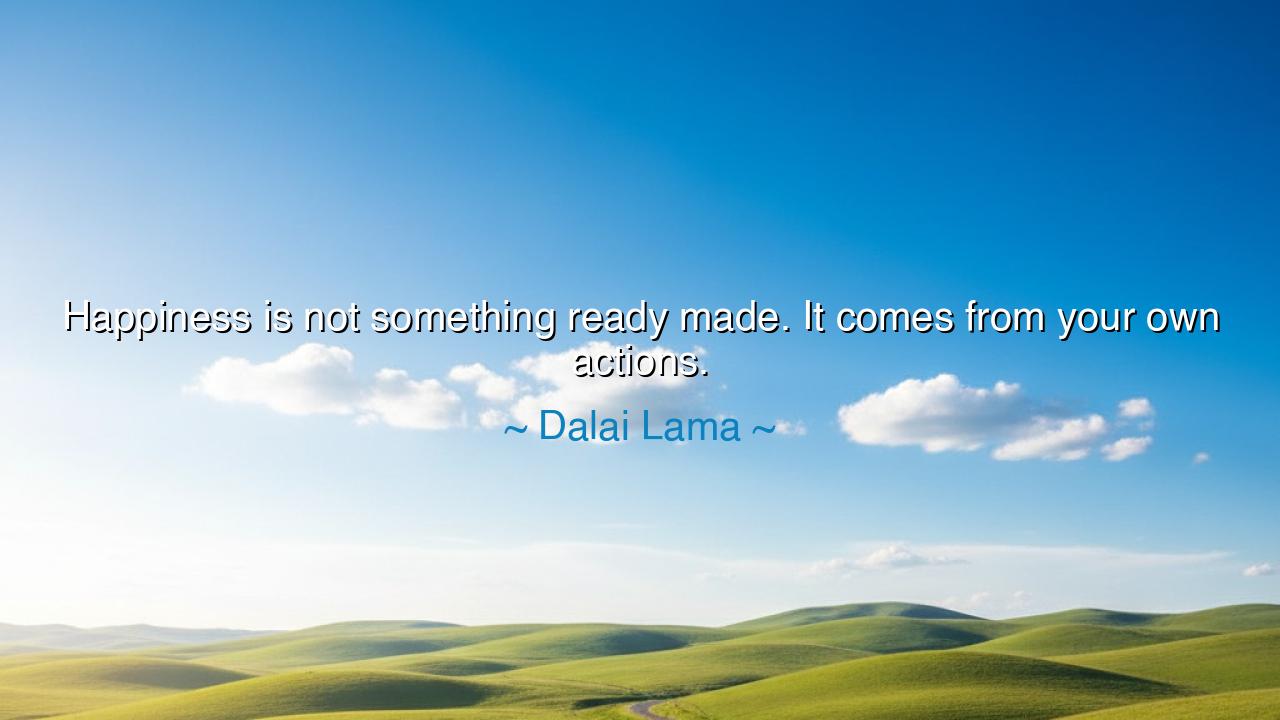
Happiness is not something ready made. It comes from your own






In the soft yet resolute voice of the Dalai Lama, a truth is spoken that pierces through illusion like dawn through fog: “Happiness is not something ready made. It comes from your own actions.” These words are not a mere proverb but a distillation of the deepest spiritual wisdom — the kind that echoes across centuries, from the sages of India to the philosophers of Greece. The Dalai Lama, a man shaped by exile and compassion, reminds us that happiness is not a gift bestowed by fortune, but a sacred labor, a creation born from the choices we make each day.
Happiness, he teaches, is not found in objects, wealth, or circumstance. It cannot be purchased, inherited, or demanded. It is not a thing that the world delivers to our door. It is a living flame we must tend within ourselves, kindled by action, by virtue, by compassion and discipline. Too many wait for joy as one waits for rain in the desert — idle, thirsty, despairing — when the truth is that the well already lies within them. To act with kindness, to speak with love, to live with purpose — these are the hands that draw water from that inner spring.
The Dalai Lama’s life itself is proof of his words. Torn from his homeland, forced into exile at a young age, he might have drowned in bitterness. Yet, rather than curse the winds of fate, he chose the action of forgiveness. He dedicated his life to peace, to teaching others how to cultivate compassion even amidst suffering. From the ashes of loss, he built not resentment, but joy. This is the secret he reveals: happiness is not born of ease, but of how one responds to difficulty. It is forged in the daily practice of goodness, gratitude, and the courage to rise above pain.
So too have others through history shown this truth in living form. Consider Viktor Frankl, the psychiatrist who endured the horrors of the concentration camps. Amid starvation and cruelty, he discovered that the last of human freedoms is the power to choose one’s attitude in any circumstance. He observed that those who found meaning in serving others, even in hell itself, preserved a light within them. Frankl’s insight — like that of the Dalai Lama — reveals that happiness is not a condition of life, but a response to it. It is an act of creation, not of chance.
The ancients also spoke of this same law. The Stoics, like Marcus Aurelius, taught that a person’s peace depends not on what happens to them, but on what they do with it. “The happiness of your life,” he wrote, “depends upon the quality of your thoughts.” Thus, action and thought are twined like the roots and branches of one tree. To live rightly — to act with wisdom, patience, and mercy — is to grow happiness as surely as the tree grows fruit. But to live passively, expecting the world to nourish us without effort, is to let the roots dry in the soil.
Action is the bridge between desire and fulfillment. It transforms longing into life. To sit and wish for happiness is to gaze at a lamp unlit; to act with kindness, gratitude, and mindfulness is to strike the flame. Each choice we make — to forgive instead of resent, to serve instead of demand, to learn instead of despair — shapes the quality of our joy. For happiness does not descend from heaven; it rises from the heart that acts with love.
Let this be the teaching passed down: Do not wait for happiness — build it. Every morning, choose actions that feed peace. Speak words that heal, not harm. Give without counting, listen without judgment, walk with humility. When anger stirs, breathe and release it. When sorrow comes, meet it with compassion. Each such act is a stone laid upon the path of joy. Step by step, through effort and intention, you will find yourself walking toward a radiant calm that no storm can steal.
And remember always: Happiness is a creation, not a coincidence. It belongs to the brave — to those who choose goodness when bitterness tempts, who act with love even when unloved, who work to bring light into the world rather than wait for it. As the Dalai Lama’s life and words remind us, the heart becomes happy not by what it receives, but by what it gives. Therefore, let your actions be your prayer, your kindness your art, and your daily living the masterpiece of your own happiness.






AAdministratorAdministrator
Welcome, honored guests. Please leave a comment, we will respond soon